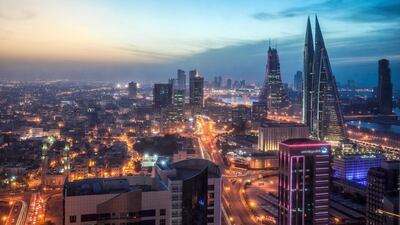Standard & Poor’s Global Ratings affirmed Bahrain’s long and short-term foreign and local currency sovereign ratings and said the outlook was stable for the Arabian Gulf’s smallest crude producer due to its access to foreign capital to support its economy.
“Government access to international capital markets has proven crucial for replenishing reserves,” S&P said in a statement released on Friday. “Our ratings on Bahrain are supported by the country's net external asset position and modest level of economic wealth.”
Bahrain’s rating was affirmed at B+/B, which is supported by the rating agency's opinion that financial support for the GCC country's exchange rate arrangement from neighbouring sovereigns would be forthcoming, if needed. S&P’s transfer and convertibility assessment of Bahrain remains at 'BB-'.
The stable rating comes days after a senior official from the International Monetary Fund said Bahrain's economy was set to grow 3.2 per cent this year with the country forecast to cut its fiscal deficit to 11 per cent of the gross domestic product in 2018. Last year the fiscal deficit was 14 per cent of GDP, while the shortfall in 2016 was 18 per cent.
Bikas Joshi who led the IMF’s delegation for Article IV consultation with Manama, said in a statement on Wednesday, that recovery in oil output, continuation of the GCC-funded projects and rising refinery and aluminium production capacity will support the country's economic growth.
______
Read more:
IMF officials see Bahrain's economy growing at 3.2 per cent in 2018
Bahrain GDP advances 3.9 per cent in 2017
Bahrain says it has discovered 80 billion barrels of shale oil
______
S&P first lowered Bahrain’s ratings in December last year, saying the downgrade reflected the GCC nation's weak external liquidity and increasing financial risk due to more limited access to international capital market financing.
However, its current stable outlook reflects “the balance between the risk that the central bank would be unable to meet a surge in demand for foreign currency over the next 12 months and potential financial support from neighbouring sovereigns.”
S&P would raise its rating of Bahrain, the smallest Arabian Gulf economy, if its net external asset position improves, either due to a significant inflow of foreign currency, or if the government takes additional steps to improve its public finance position to slow or reverse any increases in debt, it said.
However, the country's rating is constrained by continued reliance on oil revenues as well as its high stock of government debt, ongoing political tensions and the economy's weak trend growth in real GDP per capita, it noted.
While Bahrain is continuing to diversify its income away from hydrocarbons, oil still remains a key component of the country's economy. However, the sector recently received a boost following the discovery of 80 billion barrels of unconventional oil and up to 20 trillion cubic feet of tight gas off Bahrain's west coast last month.
S&P said it also expected a modest narrowing in Bahrain's current account deficit in 2018 and 2019 in comparison with the previous two years due to higher oil prices.
"According to our current forecast, the Brent oil price will average $65 per barrel in 2018 and $60 in 2019", which will support government oil's revenues, the ratings agency said.


